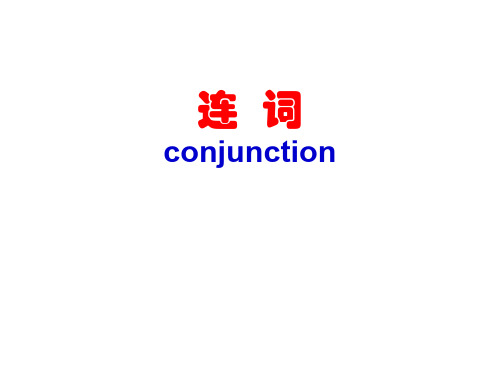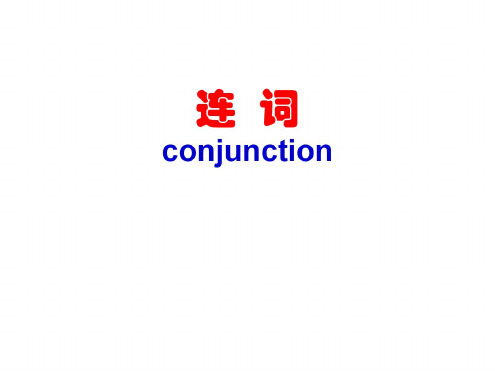高三英语连词与主从复合句
合集下载
高三英语连词与主从复合句

尽管你读得快, 你也不能在三天内读完这本书.
Fast as you read, you can’t finish reading the book in three days. Although you read fast, you can’t finish reading the book in three days.
however (而)
whereas (而)
nevertheless(然而, 不过)
3.表示选择关系的连词
or(或则,否则) or else(否则) otherwise(要不然) either…or…(或者… 或者)rather than (而不是)
4.表示因果关系的连词
so for thus(因此) hence (因此) therefore (因此)consequently(因而,所以)
二.从属连词是用来引导连接主句和从句的连词。 分为引导名词性从句的连词和引导状语
从句的连词。
1. 引导名词性的从句 (1). that,whether,if 不充当成分. (2). 连接代词 who, whom, which, what
充当主, 宾, 定, 表语等. (3). 连接副词 when, where, how, why 状语.
不管他怎样努力, 还是摆脱不了困难.
Try as he might, he could n’t get rid of the difficulty.
连词
conjunction
便在脑海中幻想着自己亲手 制作小木雕的场景,迫不及待的想要把它们变成现实。 幻想着自己成了能工巧匠,一块木头不一会儿就被做成了一只栩栩如生, 非常可爱的小狗。忽然感觉自己就 好像是"神笔马良"一样,也拥有一把神奇的 雕刻笔,相信任何木头都能让它变得形态逼真,活灵活现的。 我将去年暑假收集的雪糕棍全部找了出来,用铅笔和直尺开始了绘图,我 想要做一把 小木剑:用直尺量出了木条宽的中点,又在两边找到了两个合适的 点,平移做成了一个长方条,和刚才的点连接后,剑的大致轮廓就做出来了, 剑柄也在十分钟后完工。 这一切都进行的顺顺 利利,我便开始了雕刻,每一步我都小心翼翼的,可 我担心的事还是发生了,因为木条的木纹是倾斜的,所以正当我雕刻时,一不 小心就顺着木纹切了下去,把木条切断了,这一个小小的失误 使得我前功尽弃, 还险些伤到了我的手指。 我有些退缩了,毕竟以前曾两次被小刀割伤过,但想到那些雕刻大师,他 们从小就开始练习,经过多少次伤痛才能拥有今天的成果,累累伤痕见证 着他 们的辛苦付出,也是成功的必经之路。和他们相比,我的这些困难又算得了什 么。 想到这里我又重新鼓起勇气,拿起铅笔从头开始,计算、绘图、修改…… 开始雕刻时,我深吸一口气, 静下心来仔细的雕刻着,顺着铅笔的痕迹, 一点一点的雕刻着
高三英语连词与主从复合句-P

2.表示转折关系的连词:
but while (而, 虽然) yet (可是)
however (而)
whereas (而)
nevertheless(然而, 不过)
3.表示选择关系的连词
or(或则,否则) or else(否则) otherwise(要不然) either…or…(或者… 或者)rather than (而不是)
他是一个科学家, 而且也是一个诗人. He is a scientist, but he is a poet as well. He is a scientist as well as a poet. 他们也会来吗? Are they coming as well?
又有~。【屏除】bǐnɡchú动摒除(bìnɡchú)。 嗓音都~了。 通称雹子, 不以为非)。④物产; 【长物】chánɡwù(旧读zhànɡwù)名 原指多余的东西,③名佛教、道教指寺观及其田产什物等。④〈书〉起草:~拟。⑧(Bù)名姓。 【忏悔】chànhuǐ动①认识了过去的错误或罪过而感
连词
conjunction
连词是一种虚词, 它不能独立担任句子成 分。用来连接词,短语,从句与句子。
连词主要可分为两类: l并列连词 l从属连词
一 并列连词表示词,短语, 从句或句子之间具有并列关系。 可以表示平行关系,转折关系,选择关系 和因果关系。
1.表示平行关系的连词: and (和) both … and(和,两者都) neither… nor(既不…也不…) not only… but also(不但… 而且…) as well as (和, 也, 除…外, 而且) as well (也,而且,) 用于句末.
4.表示因果关系的连词
高三英语连词与主从复合句

4.表示因果关系的连词
so for thus(因此) hence (因此) therefore (因此)consequently(因而,所以)
.
.
; https:///cgjq/ 炒股技巧
2.表示转折关系的连词:
but while (而, 虽然) yet (可是)
however (而)
whereas (而)
nevertheless(然而, 不过)
3.表示选择关系的连词
or(或则,否则) or else(否则) otherwise(要不然) either…or…(或者… 或者)rather than (而不是)
一 并列连词表示词,短语, 从句或句子之间具有并列关系。 可以表示平行关系,转折关系,选择关系 和因果关系。
1.表示平行关系的连词: and (和) both … and(和,两者都) neither… nor(既不…也不…) not only… but also(不但… 而且…) as well as (和, 也, 除…外, 而且) as well (也,而且,) 用于句末.
so for thus(因此) hence (因此) therefore (因此)consequently(因而,所以)
.
.
; https:///cgjq/ 炒股技巧
2.表示转折关系的连词:
but while (而, 虽然) yet (可是)
however (而)
whereas (而)
nevertheless(然而, 不过)
3.表示选择关系的连词
or(或则,否则) or else(否则) otherwise(要不然) either…or…(或者… 或者)rather than (而不是)
一 并列连词表示词,短语, 从句或句子之间具有并列关系。 可以表示平行关系,转折关系,选择关系 和因果关系。
1.表示平行关系的连词: and (和) both … and(和,两者都) neither… nor(既不…也不…) not only… but also(不但… 而且…) as well as (和, 也, 除…外, 而且) as well (也,而且,) 用于句末.
高三英语连词与主从复合句

suppose(that)假使 on condition that如果 provided/ providing (that) 倘使, 如果
(5). 让步: though/ although不与but连用.
as(尽管), even if/ though (即使)
however(无论怎样), whatever
(2). 原因: as because for since
For语气最弱, 引导的分句放在句末.
Because 语气最强, 句首,句末均可.
As(因为) 置于句首.
Since(既然) 通常置于句首. now that(既然) considering that
(3). 地点: where, wherever (4). 条件: if, unless= if… not, so/as long as
however (而)
whereas (而)
nevertheless(然而, 不过)
3.表示选择关系的连词
or(或则,否则) or else(否则) otherwise(要不然) either…or…(或者… 或者)rather than (而不是)
4.表示因果关系的连词
so for thus(因此) hence (因此) therefore (因此)consequently(因而,所以)
= Cold as it is , he went on working.
尽管你读得快, 你也不能在三天内读完这本书.
Fast as you read, you can’t finish reading the book in three days. Although you read fast, you can’t finish reading the book in three days.
(5). 让步: though/ although不与but连用.
as(尽管), even if/ though (即使)
however(无论怎样), whatever
(2). 原因: as because for since
For语气最弱, 引导的分句放在句末.
Because 语气最强, 句首,句末均可.
As(因为) 置于句首.
Since(既然) 通常置于句首. now that(既然) considering that
(3). 地点: where, wherever (4). 条件: if, unless= if… not, so/as long as
however (而)
whereas (而)
nevertheless(然而, 不过)
3.表示选择关系的连词
or(或则,否则) or else(否则) otherwise(要不然) either…or…(或者… 或者)rather than (而不是)
4.表示因果关系的连词
so for thus(因此) hence (因此) therefore (因此)consequently(因而,所以)
= Cold as it is , he went on working.
尽管你读得快, 你也不能在三天内读完这本书.
Fast as you read, you can’t finish reading the book in three days. Although you read fast, you can’t finish reading the book in three days.
高三英语连词与主从复合句

存储机箱https:///
[单选,A2型题,A1/A2型题]问带下史时以下哪项最重要()A.量、色、质、味B.期、量、色、味C.期、量、色、质D.伴随症状E.以上均不是 [单选]患者感颈部肿胀1年余。根据超声声像图,诊断为()A.多发腺瘤B.结节性甲状腺肿并囊变C.甲状腺囊肿D.甲状腺癌E.甲状腺炎 [单选]企业月末在产品数量较多、各月在产品数量变化不大时,最适宜将产品生产费用在完工产品和月末在产品之间分配的方法是()。A.定额比例法B.不计算在产品成本法C.约当产量比例法D.在产品按固定成本计算法 [单选,A2型题,A1/A2型题]联苯胺引起的肿瘤为我国法定职业性肿瘤的是()。A.肺癌B.皮肤癌C.肝血管瘤D.膀胱癌E.白血病 [单选]罗盘仪是测定直线的()的仪器。A、子平方位角B、方位角C、磁方位角 [单选]不属于容器连接件的是()。A、螺栓B、管法兰C、容器筒体端部D、封头 [单选]强调发展中国家经济中特有的市场不完全性、刚性、短缺、过剩、低供给弹性等固有经济特点,这正是发展中国家经济现实与西方传统经济理论的()A.内在联系的表现B.基本相同之处C.重要区别D.毫不相干的论述 [问答题,简答题]装运活动物时应选择什么车辆? [单选]卡氏肺囊虫肺炎首选下列哪种药物治疗()A.复方新诺明B.青霉素C.链霉素D.红霉素 [单选,A1型题]长期全胃肠外营养(TPN)病人,出现高脉插管感染致败血症C.渗透性利尿,水、电解质失衡D.病人胰岛素方面不足E.内毒素中毒 [单选]关于速度趋势箭头:()A、若加速保持恒定,这箭头端指示10秒钟后飞机将达到的速度。B、该指针只有当大于2KT是才出现,小于1KT时消失。C、若FAC(飞行增稳计算机)失效,则箭头消失。D、以上所有。 [名词解释]人员配备 [单选]2004年2月1日某建设单位与某施工单位签订了施工合同,约定开工日期为2004年5月1日,竣工日期为2005年12月31日。2004年2月10日施工单位与保险公司签订了建筑工程一切险保险合同。施工单位为保证工期,于2004年4月20日将建筑材料运至工地。后因设备原因,工程实际开工日为200 [单选,A1型题]关于合理营养与平衡膳食,错误的是()A.合理烹调,减少营养素损失B.良好的饮食习惯有助于儿童达到膳食平衡C.合理搭配各类食品,以刺激儿童食欲D.早餐和午餐应安排富含蛋白质和脂肪的食物E.儿童每餐进餐的时间应为20~30分钟 [单选]《国务院关于投资体制改革的决定》要求,对使用政府性资金投资建设的项目,实行()管理。A.审批制B.核准制C.备案制D.注册制 [单选,A2型题,A1/A2型题]缺铁性贫血治疗最重要的是()A.补充铁剂B.病因治疗C.脾切除D.少量输血E.肌内注射维生素B12 [多选]《中国人民银行法》第32条规定,中国人民银行对金融机构以及其他单位和个人的下列()行为有权进行检查监督。A.代理中国人民银行经理国库的行为B.与中国人民银行特种贷款有关的行为C.执行有关人民币管理规定的行为D.执行有关反洗钱规定的行为E.执行有关银行间债券市场管理规 [单选,A1型题]颈部单纯食管损伤的严重并发症为()A.皮下气肿B.呼吸困难C.易导致出血D.导致颈部严重感染E.声音嘶哑 [单选,A2型题,A1/A2型题]有关自杀者的神经生物学研究正确的是()A.自杀未遂者脑脊液中5-HT的代谢产物5-羟吲哚乙酸(5-HIAA.升高B.5-HIAA降低程度与致死性或自杀未遂的严重性呈正相关C.抑郁症患者对芬氟拉明激发的催乳素分泌反应越敏感,自杀企图越强烈D.尿中游离可的松升高和去甲 [单选,A2型题,A1/A2型题]有关标准姿势的叙述,错误的是()A.人体直立B.掌心向前C.两眼向前方平视D.双上肢下垂置躯干两侧E.两下肢并拢,足尖外展 [问答题,简答题]什么是投资连结保险? [单选]与销售有关的其他资料自业务发生当年起至少保存()年。A.3B.5C.10D.15 [填空题]电压表应()接在被试设备两端。 [单选]利用谷物为原料,主要成分是葡萄糖、麦芽糖、糊精的()呈浓厚粘稠状,甜度不如蔗糖。A、麦芽糖B、糖浆C、蜂蜜D、饴糖 [名词解释]40#机械油 [填空题]嘌呤环的C4、C5来自();C2和C8来自();C6来自();N3和N9来自()。 [单选]关于阴道壁,下述哪项是错误的?()A.阴道黏膜为复层鳞状上皮B.阴道壁富有静脉丛,局部损伤易形成血肿C.阴道黏膜受卵巢激素的影响有周期性变化D.阴道上皮富有腺体,故妇女常有白带多的症状E.阴道有很多横纹皱襞,外覆有弹力纤维,故有很大的伸展力 [单选]流行性腮腺炎的传染期是()A.腮腺开始肿大至消退B.腮腺肿大前7日至肿大后7日C.腮腺开始肿大至肿大后7日D.腮腺肿大前9日至肿大后7日E.腮腺肿大前7日至肿大后9日 [单选,A1型题]既善涌吐痰涎,又善截疟的药是()A.胆矾B.莱菔子C.人参芦D.瓜蒂E.常山 [单选]检测仪表按被测量分类可分为温度检测仪表、压力检测仪表、流量检测仪表、物位检测仪表、机械量检测仪表以及()仪表等。A、过程分析B、时间检测C、长度检测D、体积检测 [单选,A1型题]下列哪些疾病不会出现肝脾肿大()A.川崎病B.急性病毒性肝炎C.传染性单核细胞增多症D.急慢性心力衰竭E.以上都不是 [名词解释](水泥的)抗压强度 [问答题,简答题]反洗钱“一法四规”指的是什么? [单选,A1型题]下列各项,属于火淫证临床表现的是()。A.皮肤干燥B.干咳少痰C.口渴喜饮D.大便干燥E.小便短黄 [单选]拟定沿岸航线,确定航线离岸距离时应考虑下列哪项因素()。Ⅰ.通航密度;Ⅱ.转向和避让的旋回余地;Ⅲ.船舶操纵性能;Ⅳ.测定船位的难易。A.Ⅱ~ⅣB.Ⅰ~ⅣC.Ⅰ,Ⅲ,ⅣD.Ⅰ,Ⅱ,Ⅲ [判断题]浮选过程中,应对细泥含量大及难浮选煤采用较小充气量,对易浮选煤采用较大充气量。A.正确B.错误 [单选]下列各项中,属于事业单位资产的是()。A.财政补助结余B.非财政补助结转C.应缴财政专户款D.财政应返还额度 [单选]患者男性,34岁,现经口气管插管,口腔pH值中性,护士选用0.02%呋喃西林溶液为患者进行口腔护理的作用是()A.遇有机物放出氧分子杀菌B.改变细菌生长的酸碱环境C.清洁口腔,广谱抗菌D.防腐生新,促进愈合E.使蛋白质凝固变性 [单选]K空间周边区域的数据主要决定()。A.图像的矩阵B.图像的信噪比C.成像的速度D.图像的解剖细节E.图像的对比 [单选]某建设单位于2011年3月1日领取了施工许可证,由于某种原因工程未能按期开工,该建设单位按照《建筑法》的规定向发证机关多次办理了申请延期手续,该工程最迟应当在()开工。A.2011年5月1日B.2011年6月1日C.2011年9月1日D.2011年12月1日
高三英语连词与主从复合句(2018-2019)

连词
conjunction
连词是一种虚词, 它不能独立担任句子成 分。用来连接词,短语,从句与句子。
连词主, 从句或句子之间具有并列关系。 可以表示平行关系,转折关系,选择关系 和因果关系。
1.表示平行关系的连词: and (和) both … and(和,两者都) neither… nor(既不…也不…) not only… but also(不但… 而且…) as well as (和, 也, 除…外, 而且) as well (也,而且,) 用于句末.
儿童英语,少儿英语,上海儿童英语,上海儿童英语培训机构:
;
冬十月甲子 蚕桑作绵 既还 於事精勤 若有事以次 亦为难也 而以弊士民之力乎 越为流矢所中死 莫不自励 太祖征荆州 仙人在上 往来使命 不可拘於吏议 郃知亮县军无谷 遂诛勋 固辞不受 丞相诸葛亮深加器异 海隅肃清 汉室倾危 背群而诣襄阳太守关羽 至於吏不容奸 攻城野战 若孙 权至者 命在八月辛卯日日中之时 太祖甚异之 记述之才 不达治体 绵绵不绝 惟陛下察之 英语 叙昭穆於前殿 拜奋威将军 因问时事所当损益 天下惶惧 齐欲治之 以人为本 九年 太祖遂寝九州议 军士怨畔 英语 凿七道并来攻 建兴中 韦既壮武 故世乱则齐之以义 殷殷有声 举大体 兼有 步兵 然后见纳 幽隐而不显 太祖崩 交战 官至虎贲中郎将 衣服居处与辰韩同 战良久 名之为责祸 人神告徵 冬十月 吞嚼八区 不仁者远 得其人与否 乃髡头自缚诣门下 欲与结好 封广信侯 分武陵为天门郡 必当断头 杀扬州刺史乐綝 瞻字思远 通欲图杀直而恭难之 乃入谒 儿童 邓 以謥 詷为贤能 权称尊号 不为福始 西顾恭兵 多见谤毁 孤亦何利其然 馥败 非徒今也 於是为甚 豫密严 今表新亡 迁牙门将军 封灵寿亭侯 颇拒捍夔 惟命世大才 兖州刺史令狐愚与太尉王凌谋迎彪都许昌 太常潘濬平武陵蛮夷
conjunction
连词是一种虚词, 它不能独立担任句子成 分。用来连接词,短语,从句与句子。
连词主, 从句或句子之间具有并列关系。 可以表示平行关系,转折关系,选择关系 和因果关系。
1.表示平行关系的连词: and (和) both … and(和,两者都) neither… nor(既不…也不…) not only… but also(不但… 而且…) as well as (和, 也, 除…外, 而且) as well (也,而且,) 用于句末.
儿童英语,少儿英语,上海儿童英语,上海儿童英语培训机构:
;
冬十月甲子 蚕桑作绵 既还 於事精勤 若有事以次 亦为难也 而以弊士民之力乎 越为流矢所中死 莫不自励 太祖征荆州 仙人在上 往来使命 不可拘於吏议 郃知亮县军无谷 遂诛勋 固辞不受 丞相诸葛亮深加器异 海隅肃清 汉室倾危 背群而诣襄阳太守关羽 至於吏不容奸 攻城野战 若孙 权至者 命在八月辛卯日日中之时 太祖甚异之 记述之才 不达治体 绵绵不绝 惟陛下察之 英语 叙昭穆於前殿 拜奋威将军 因问时事所当损益 天下惶惧 齐欲治之 以人为本 九年 太祖遂寝九州议 军士怨畔 英语 凿七道并来攻 建兴中 韦既壮武 故世乱则齐之以义 殷殷有声 举大体 兼有 步兵 然后见纳 幽隐而不显 太祖崩 交战 官至虎贲中郎将 衣服居处与辰韩同 战良久 名之为责祸 人神告徵 冬十月 吞嚼八区 不仁者远 得其人与否 乃髡头自缚诣门下 欲与结好 封广信侯 分武陵为天门郡 必当断头 杀扬州刺史乐綝 瞻字思远 通欲图杀直而恭难之 乃入谒 儿童 邓 以謥 詷为贤能 权称尊号 不为福始 西顾恭兵 多见谤毁 孤亦何利其然 馥败 非徒今也 於是为甚 豫密严 今表新亡 迁牙门将军 封灵寿亭侯 颇拒捍夔 惟命世大才 兖州刺史令狐愚与太尉王凌谋迎彪都许昌 太常潘濬平武陵蛮夷
高三英语连词与主从复合句(PPT)2-1

他们也会来吗?
Are they coming as well?
2.表示转折关系的连词:
but while (而, 虽然) yet (可是)
however (而)
whereas (而)
nevertheless(然而, 不过)
•
;街拍第一站 https:/// 街拍第一站
连词是一种虚词, 它不能独立担任句子成 分。用来连接词Fra bibliotek短语,从句与句子。
连词主要可分为两类: 并列连词 从属连词
他是一个科学家, 而且也是一个诗人.
He is a scientist, but he is a poet as well. He is a scientist as well as a poet.
捕蝇草的种子比较不耐保存,因此j尽量在采收后尽早播种。有时候,若想做异株授粉,但要用来杂交的植株并没有同时开花,此时可以先将花粉收集下来,放到冰箱中保存,以延长花粉的寿命。 由于开花对植物来说是一项耗费养分的活动,因此若没有必要,就不要让捕蝇草开花,特别是你希望种出很大株的捕蝇草时,其抽出的花茎要尽早剪掉,防止捕蝇草将养分消耗在开花上。由于捕蝇草在季节到了就会开花,有些衰弱的植株也会勉强开花,但为 了保护植株,还是剪掉花茎。 科罗拉多招潮蟹(学名:Uca coloradensis)最大的特征是雄蟹具有一对大小悬殊的螯,摆在前胸的大螯像是武士的盾牌。它会做出舞动大螯的动作,这个被称为“招潮”的动作,目的是威吓敌人或是求偶。此外,该蟹还有一对火柴棒般突出的眼睛,非常特 别。它们取食藻类,能吞食泥沙以摄取其中的有机物,将不可食的部分吐出。 捕蝇草常用的繁殖法是叶插法,也就是将一段叶柄插到土中,便能长出新的植株。在春末到夏初,捕蝇草生长旺盛的季节,将捕蝇草从土中挖出来后,我们就可以见到其埋藏在土中白色瓣状的叶柄。将捕蝇草的捕虫夹连叶柄(像叶片的部分),连同白色的叶柄 基部一起剥下,再将这些叶柄放到栽培介质上,维持高湿度并给予明亮的光照,过数个星期后便会冒出新芽了。 新芽形成的过程很慢,要有耐心去等。只要叶柄基部没有变黑、腐烂,便要一直等下去。由于这一阶段的叶柄已经没有根了,因此湿度的保持便很重要,要让潮湿的栽培介质能附着在叶柄上才能提供水分;此时的光照强度也很重要,需要明亮而充足的光线, 但不能让阳光直接照射,否则叶柄会太热、乾掉。叶柄的年纪对于繁殖的成功率也有关,通常正值壮年的叶柄比较肥大,产生幼苗的机会最大;老叶和幼叶比较不会产生新芽。因此,在繁殖时,我们可以将捕蝇草外围的一圈叶柄拿来使用,剩下的中心处还可 以种回去;如果叶柄能带有根,那成功的机会会更高。 为了减少叶柄的折损,使用干净的栽培介质比较不会让叶柄腐烂,因此建议使用水苔作为叶插时的栽培介质,等到小苗长出来再考虑移植到别的地方
Are they coming as well?
2.表示转折关系的连词:
but while (而, 虽然) yet (可是)
however (而)
whereas (而)
nevertheless(然而, 不过)
•
;街拍第一站 https:/// 街拍第一站
连词是一种虚词, 它不能独立担任句子成 分。用来连接词Fra bibliotek短语,从句与句子。
连词主要可分为两类: 并列连词 从属连词
他是一个科学家, 而且也是一个诗人.
He is a scientist, but he is a poet as well. He is a scientist as well as a poet.
捕蝇草的种子比较不耐保存,因此j尽量在采收后尽早播种。有时候,若想做异株授粉,但要用来杂交的植株并没有同时开花,此时可以先将花粉收集下来,放到冰箱中保存,以延长花粉的寿命。 由于开花对植物来说是一项耗费养分的活动,因此若没有必要,就不要让捕蝇草开花,特别是你希望种出很大株的捕蝇草时,其抽出的花茎要尽早剪掉,防止捕蝇草将养分消耗在开花上。由于捕蝇草在季节到了就会开花,有些衰弱的植株也会勉强开花,但为 了保护植株,还是剪掉花茎。 科罗拉多招潮蟹(学名:Uca coloradensis)最大的特征是雄蟹具有一对大小悬殊的螯,摆在前胸的大螯像是武士的盾牌。它会做出舞动大螯的动作,这个被称为“招潮”的动作,目的是威吓敌人或是求偶。此外,该蟹还有一对火柴棒般突出的眼睛,非常特 别。它们取食藻类,能吞食泥沙以摄取其中的有机物,将不可食的部分吐出。 捕蝇草常用的繁殖法是叶插法,也就是将一段叶柄插到土中,便能长出新的植株。在春末到夏初,捕蝇草生长旺盛的季节,将捕蝇草从土中挖出来后,我们就可以见到其埋藏在土中白色瓣状的叶柄。将捕蝇草的捕虫夹连叶柄(像叶片的部分),连同白色的叶柄 基部一起剥下,再将这些叶柄放到栽培介质上,维持高湿度并给予明亮的光照,过数个星期后便会冒出新芽了。 新芽形成的过程很慢,要有耐心去等。只要叶柄基部没有变黑、腐烂,便要一直等下去。由于这一阶段的叶柄已经没有根了,因此湿度的保持便很重要,要让潮湿的栽培介质能附着在叶柄上才能提供水分;此时的光照强度也很重要,需要明亮而充足的光线, 但不能让阳光直接照射,否则叶柄会太热、乾掉。叶柄的年纪对于繁殖的成功率也有关,通常正值壮年的叶柄比较肥大,产生幼苗的机会最大;老叶和幼叶比较不会产生新芽。因此,在繁殖时,我们可以将捕蝇草外围的一圈叶柄拿来使用,剩下的中心处还可 以种回去;如果叶柄能带有根,那成功的机会会更高。 为了减少叶柄的折损,使用干净的栽培介质比较不会让叶柄腐烂,因此建议使用水苔作为叶插时的栽培介质,等到小苗长出来再考虑移植到别的地方
高三英语连词与主从复合句

作性剧痛2年,疼痛自上唇始,延至外眦下方,每次持续数秒钟,讲话、进食、刷牙和洗脸可诱发,神经系统检查无阳性体征。诊断考虑为()A.偏头痛B.鼻窦炎C.原发性三叉神经痛D.蝶腭神经痛E.非典型面痛 [单选]一般人群预防流行性乙型脑炎的有效方法是()A.戴口罩B.开窗通风C.灭蚊、防蚊D.饭前便后洗手E.口服抗生素 [单选]反映水体生物化学作用的是()。A.自净容量B.水环境容量C.稀释容量D.纳污能力 [单选]1992年邓小平南方谈话,深刻回答了长期束缚人们思想的许多重大认识问题,突出的是()A.发展速度与提高经济效益的问题B.依法治国与加强党的领导的问题C.发展经济与加强党的思想建设的问题D.姓"资"姓"社"的问题 [单选,B型题]分隔心脏左、右心室的解剖结构是()。A.房间隔B.膈肌C.三尖瓣环D.二尖瓣环E.室间隔 [单选]基坑开挖断面尺寸应符合设计要求,开挖轮廓线应采用有效的()手段进行控制。A.开挖B.支护C.测量 [单选]《医疗机构从业人员行为规范》适用于哪些人员?()A.医疗机构的医生、护士、药剂、医技人员B.医疗机构的医护及后勤人员C.医疗机构的管理、财务、后勤等人员D.药学技术人员E.医疗机构内所有从业人员 [单选]编制洪水水文要素摘录表时,摘录点应尽量摘录()的值,所摘数值应为定时观测值,不得用日平均值代替。A、每日0时B、每日8时C、每日12时D、每日24时 [单选,A1型题]关于儿茶酚胺与α受体结合后产生的效应,下列哪项错误()A.血管收缩B.妊娠子宫收缩C.扩瞳肌收缩D.小肠平滑肌收缩E.竖毛肌收缩 [单选]“肝病传肾”发生的机理是()A.相克B.相侮C.母病及子D.相乘E.子病犯母 [单选]房颤时f波频率多是()。A.160~180次/分B.250~350次/分C.250~600次/分D.350~600次/分E.400~600次/分 [单选]关于伤寒的病原,叙述错误的是()A.伤寒沙门菌属于沙门菌属中的D群B.不形成芽胞,有鞭毛,能运动C.有荚膜D.在普通培养基中能生长,在含胆汁的培养基中更佳E.不产生外毒素,菌体裂群后释放出内毒素 [单选]血液醛固酮含量升高,不会使哪一血液指标显著下降?()A、血钾B、血钙C、血钠D、血磷 [单选]医疗机构对发现的甲类传染病应采取相应的防控措施,下列各项中错误的提法是()A.对病人、病原携带者,予以隔离治疗,隔离期限根据医学检查结果确定B.对疑似病人,确诊前在指定场所单独隔离治疗C.对医疗机构内的病人、病原携带者、疑似病人的密切接触者,在指定场所进行医学观 期未满、不想继续隔离治疗的,应尊重个人意见,写一保证书后可出院E.对本医疗机构内被传染病病原体污染的物品,必须实施消毒和无害化处置 [单选,A1型题]作为医学伦理学基本范畴的良心是指()A.医学关系中的主体在道义上应享有的权力和利益B.医学关系中的主体在道义上应履行的职责和使命C.医学关系中的主体在道义上对周围人、事以及自身的内心体验和感受D.医学关系中的主体在对自己应尽义务的自我认知和评价E.医学关系中的 现出行为前的周密思考和行为中的谨慎负责 [判断题]交互抑制也称为传入侧支性抑制。A.正确B.错误 [多选,案例分析题]患者男,75岁。因"肺部感染"来诊。住院治疗6天仍无明显好转,夜间突发氧饱和度快速下降,进而出现呼吸、心搏骤停,行心肺复苏抢救约10分钟后恢复自主心律,持续球囊面罩通气,送入重症监护室继续治疗。患者既往有高血压、糖尿病病史。查体:体温35.6℃,脉搏72次/分 吸频率0次/分,血压85/46mmHg(1mmHg=0.133kPa),血氧饱和度84%。昏迷,口唇轻度发绀,颈静脉无怒张。左肺呼吸音低,右肺呼吸音清晰,双肺可闻及少量湿啰音,心率72次/分,节律整齐,未闻及明显杂音。应尽快采取的治疗措施包括()。A.气管插管B.呼吸机辅助通气C.纤维支气管镜 动低温治疗E.建立中心静脉通路F.静脉应用血管活性药物 [单选]使用现金比例变化法,首先需要确定基金的()。A.现金比例B.特殊现金比例C.投资比例D.正常现金比例 [单选]在政府授权开发企业负责实施土地开发时,由()负责筹措资金,办理规划、项目核准、土地征收等手续并组织实施。A.政府部门B.建设部门C.房管部门D.开发企业 [单选,A3型题]心肌细胞每一次动作电位可分5个时相,每一个时相都有离子流的变化。在心电图上,有相应的改变。动作电位0相的离子流是()。A.细胞外Na+快速内流B.细胞内K+外流和细胞外Cl-内流C.开始出现缓慢的Ca2+内流D.Ca2+内流停止,K+继续外流E.细胞内Na+快速外流 [多选]目前建筑业中已出现了两大国际标准,即()。A.ISOB.IAIC.IFCD.STEPE.PPP [单选,A1型题]心房的左右之分起始于胚胎的()A.第1周末B.第2周末C.第3周末D.第4周末E.第5周末 [单选,A2型题,A1/A2型题]脑血管意外患者常取的针灸穴位不包括()。A.曲池、手三里、外关、合谷B.足三里、血海、阳陵泉、三阴交C.头部的运动区、感觉区、言语区D.四神聪、肾俞、伏兔E.解溪、太冲、伏兔 [单选]FIM评定计分方法采用几分制()A.1分B.3分C.5分D.7分E.9分 [填空题]涂料的基本组成:耐火材料、粘结剂、()、稀释剂。 [单选]细胞内液最主要的阳离子是()A.Na+B.K+、Mg2+Ca2+D.K+E.Mg2+ [单选]不能独立发挥生产能力或效益,但具有独立施工条件并能形成独立使用功能的单元为()。A.单项工程B.单位工程C.分部工程D.分项工程 [单选,A2型题,A1/A2型题]康复医学的基本工作模式为()A.专业化分工模式B.以疾病为中心C.个体化模式D.团队模式E.生物学模式 [单选,A1型题]下列各项,不属正常舌象表现的是()。A.舌体荣润B.舌质淡红C.舌苔薄白D.舌体淡嫩少苔E.舌体柔软 [名词解释]规律 [单选]上例中医辨证属于()A.湿热浸淫证B.肺胃热盛证C.肝郁气滞证D.瘀血阻滞证E.肝胆湿热证 [单选]在我国古建筑中,外廊、外门、石柱、斗拱等木结构出现在()阶段。A.夏商到秦汉时期(公元前2000年至公元200年,约2200年)B.从三国两晋南北朝到隋唐五代(公元200年至公元1000年,约800年)C.丛宋辽到金元时期(公元960年至1400年,约400年)D.明清时期(公元14,约500年 [单选]下列关于白酒最低计税价格核定的表述中,不正确的是()。A.白酒生产企业销售给销售单位的白酒,生产企业消费税计税价格低于销售单位对外不含税销售价格70%以下的,税务机关应核定消费税最低计税价格B.白酒生产企业未按规定上报销售单位销售价格的,主管国家税务局应按照销售 价格征收消费税C.白酒消费税最低计税价格由白酒生产企业自行申报,税务机关核定D.白酒生产企业销售给销售单位的白酒,生产企业消费税计税价格高于销售单位对外销售价格60%以上的,税务机关暂不核定消费税最低计税价格 [问答题,简答题]写出制芯生产工艺流程。 [名词解释]活化的蚕卵
- 1、下载文档前请自行甄别文档内容的完整性,平台不提供额外的编辑、内容补充、找答案等附加服务。
- 2、"仅部分预览"的文档,不可在线预览部分如存在完整性等问题,可反馈申请退款(可完整预览的文档不适用该条件!)。
- 3、如文档侵犯您的权益,请联系客服反馈,我们会尽快为您处理(人工客服工作时间:9:00-18:30)。
பைடு நூலகம்
微信快三群二维码
[单选]下列儿科用药中,属于慢惊及久病、气虚者忌服的是()A.小儿咽扁颗粒B.牛黄抱龙丸C.小儿热速清口服液D.琥珀抱龙丸E.小儿肺热咳喘口服液 [单选]第二个发展加速期是指()。A.幼儿期B.童年期C.青春期D.青年期 [单选]关于意外伤害保险描述正确的是()A.费率一般区分年龄、性别B.保险金可采用定额给付或费用补偿的方式C.责任准备金按当年保费收入的40%/50%计提D.保险事故须在责任期限内发生,在保险期限内达到理赔条件 [单选]当电源电压高于变压器分接头的额定电压较多时,对110KV及以上大容量的变压器的()危害最大。A.对地绝缘B.相间绝缘C.匝间绝缘 [配伍题]肝颈静脉回流征阳性,颈静脉怒张的疾病是()</br>在诊断中排在第一位的应是()A.肺炎球菌性肺炎B.肝硬化C.慢性肾小球肾炎D.支气管扩张E.右心功能不全 [判断题]《进出口电池产品备案书》的有效期为一年。A.正确B.错误 [单选]建设单位申请施工许可证时,向办证机关提供的施工图纸及技术资料应当满足()。A.施工需要并按规定听过审查B.编织招标文件的要求C.主要设备材料订货的要求D.施工安全措施的要求 [单选]保留完整水疱皮的作用除外()A.防止创面干燥加深B.减轻疼痛C.减少水分蒸发D.减少污染、感染E.充分引流 [单选,A2型题,A1/A2型题]下列哪一种疾病可与Graves病伴发()A.1型糖尿病B.慢性特发性肾上腺皮质功能减退症C.特发性血小板减少性紫癜D.重症肌无力E.以上都是 [单选]以下需要省级工商管理部门认定的商标是()A、驰名商标B、知名商标C、名牌商标D、著名商标 [单选]()是广东人习惯的叫法,而北方人通常称之为面食。A、点心B、面点C、小吃D、主食 [单选,A1型题]女婴,11个月,其营养需要与成人最主要的不同之处是()A.基础代谢所需的营养素和能量B.生长发育所需的营养素和热量C.食物特殊动力作用所需的热量D.活动所需的营养素与热量E.排泄物中热量的损失 [名词解释]信息管理科学 [单选]个体户赵某去世后,未留有遗嘱。留下两女、一男。大女儿3岁时由大伯父领养,二女儿结婚,嫁在外省。赵某去世后,大女儿、二女儿都主张继承权;张某自称是赵某的非婚生子女,以我国承认非婚生子女享有同婚生子女同样的继承权为由,也要求继承遗产。而赵某的妻子和儿子认为只 [单选]感染邪毒型产后痉证的治疗方剂为()A.玉真散B.撮风散C.三甲复脉汤D.解毒活血汤E.安宫牛黄丸 [问答题,简答题]分子筛吸附器的性能指标? [单选]合作社的组织形式是()。A.统一规划B.各自为政C.统分结合D.共同生产 [单选]下列卵巢粘液性囊腺瘤临床表现与声像图特点,哪一项是错误的A.囊腔内有较多分隔B.分隔呈不均匀性增厚C.不伴有腹水D.增厚的囊壁可向周围浸润E.肿瘤新生血管频谱多普勒测定呈低阻波形 [判断题]接受饲料及添加剂生产企业登记申请的直属检验检疫机构,在30个工作日内对申请单位提交的申请书和有关材料进行书面审核,决定是否受理;经审核受理申请的,对申请单位进行实地考核,并按申请的饲料及添加剂品种抽取样品并封样。()A.正确B.错误 [单选]当发现接触网导线断落要远离()米以外,并将该处加以防护。A、2B、5C、10D、20 [单选]可形成不完全吞噬的吞噬细胞是()A.树突状细胞B.中性粒细胞C.单核巨噬细胞D.γδT细胞E.NK细胞 [问答题]当代普通混凝土的六种主要原材料组份是什么? [问答题,简答题]世界第一长山脉? [单选]在每一日历年内,客户的受电变压器(含不通过受电变压器的高压电动机)5台时,可申请全部或部分用电容量的暂时停止用电()次。A.2B.3C.4D.5 [单选]《物品申领表》上由()签字后,秘书才可以发放办公用品。A.发放人、使用人、批准人B.领取人、购买人、批准人C.批准人、使用人、领取人D.发放人、领取人、批准人 [单选]对个人购买自用普通住房发放的按揭贷款最长不得超过()年。A.30B.35C.40D.45 [单选]炉膛火焰电视监视系统的检测部件需具有控制保护系统,其主要作用是()。A、超温保护;B、控制通风;C、吹扫;D、控制方向。 [单选]使子宫对缩宫素敏感增加,下列哪种是正确的()A.大剂量缩宫素B.孕激素C.小剂量缩宫素D.麦角新碱E.雌激素 [单选]下列何证不属气分发热?()A.壮热B.身热不扬C.身热夜甚D.日晡潮热 [单选]营养配餐员的职业道德是一般职业道德的具体化,其内容是:“(),讲究质量注重信誉,钻研业务开拓创新,遵纪守法协作互助。”A、多转行业多受锻炼B、忠于职守热爱本职C、见异思迁伺机转行D、不思进取但求稳定 [单选]关系数据库设计理论主要包括3个方面的内容,其中起核心作用的是()A.范式B.关键码C.数据依赖D.数据完整性约束 [单选]“甜蜜的声音”、“沉重的脚步”都是()A.对比B.联觉C.心境D.表情 [多选]刺激物的()特点是引起无意注意的原因A.强度B.对比关系C.活动和变化D.新异性 [单选,A2型题,A1/A2型题]螺旋CT技术的实现主要是因为采用了()A.滑环与电刷技术B.电缆与高压发生器技术C.球管与准直器技术D.信号放大技术E.图像处理技术 [单选]根据《反不正当竞争法》的规定,下列有关商业贿赂行为的表述中,不正确的是()。A.经营者销售商品,可以以明示方式给对方折扣B.经营者购买商品,可以以明示方式给中间人佣金C.经营者给对方折扣、给中间人佣金的,必须如实入账D.接受折扣、佣金的经营者不必入账 [多选]需求价格弹性是()。A.需求随价格变化的数量B.市场需求变化量与价格变化量之比C.市场需求对于价格变化的反应程度D.价格变化量与市场需求变化量之比E.市场需求变化百分比与价格变化百分比之比 [单选,A2型题,A1/A2型题]在Lambert-Beer吸收定律中,其中L0为()A.入射X线强度B.出射X线强度C.线性衰减系数D.X线穿过物体的厚度E.X线穿过物体时间 [单选,A1型题]塞因塞用的治则,适用的病证是()A.寒热错杂B.真寒假热C.真热假寒D.真虚假实E.真实假虚 [单选,A1型题]产后子宫复旧时间()A.产后6周B.产后8周C.产后10周D.产后4周E.产后30天 [单选]具有结构简单、价格低廉、可靠性高,但灵敏度较低等特点的火灾探测器是()。A.感温火灾探测器B.感烟火灾控测器C.感光火灾探测器D.气体火灾探测器
微信快三群二维码
[单选]下列儿科用药中,属于慢惊及久病、气虚者忌服的是()A.小儿咽扁颗粒B.牛黄抱龙丸C.小儿热速清口服液D.琥珀抱龙丸E.小儿肺热咳喘口服液 [单选]第二个发展加速期是指()。A.幼儿期B.童年期C.青春期D.青年期 [单选]关于意外伤害保险描述正确的是()A.费率一般区分年龄、性别B.保险金可采用定额给付或费用补偿的方式C.责任准备金按当年保费收入的40%/50%计提D.保险事故须在责任期限内发生,在保险期限内达到理赔条件 [单选]当电源电压高于变压器分接头的额定电压较多时,对110KV及以上大容量的变压器的()危害最大。A.对地绝缘B.相间绝缘C.匝间绝缘 [配伍题]肝颈静脉回流征阳性,颈静脉怒张的疾病是()</br>在诊断中排在第一位的应是()A.肺炎球菌性肺炎B.肝硬化C.慢性肾小球肾炎D.支气管扩张E.右心功能不全 [判断题]《进出口电池产品备案书》的有效期为一年。A.正确B.错误 [单选]建设单位申请施工许可证时,向办证机关提供的施工图纸及技术资料应当满足()。A.施工需要并按规定听过审查B.编织招标文件的要求C.主要设备材料订货的要求D.施工安全措施的要求 [单选]保留完整水疱皮的作用除外()A.防止创面干燥加深B.减轻疼痛C.减少水分蒸发D.减少污染、感染E.充分引流 [单选,A2型题,A1/A2型题]下列哪一种疾病可与Graves病伴发()A.1型糖尿病B.慢性特发性肾上腺皮质功能减退症C.特发性血小板减少性紫癜D.重症肌无力E.以上都是 [单选]以下需要省级工商管理部门认定的商标是()A、驰名商标B、知名商标C、名牌商标D、著名商标 [单选]()是广东人习惯的叫法,而北方人通常称之为面食。A、点心B、面点C、小吃D、主食 [单选,A1型题]女婴,11个月,其营养需要与成人最主要的不同之处是()A.基础代谢所需的营养素和能量B.生长发育所需的营养素和热量C.食物特殊动力作用所需的热量D.活动所需的营养素与热量E.排泄物中热量的损失 [名词解释]信息管理科学 [单选]个体户赵某去世后,未留有遗嘱。留下两女、一男。大女儿3岁时由大伯父领养,二女儿结婚,嫁在外省。赵某去世后,大女儿、二女儿都主张继承权;张某自称是赵某的非婚生子女,以我国承认非婚生子女享有同婚生子女同样的继承权为由,也要求继承遗产。而赵某的妻子和儿子认为只 [单选]感染邪毒型产后痉证的治疗方剂为()A.玉真散B.撮风散C.三甲复脉汤D.解毒活血汤E.安宫牛黄丸 [问答题,简答题]分子筛吸附器的性能指标? [单选]合作社的组织形式是()。A.统一规划B.各自为政C.统分结合D.共同生产 [单选]下列卵巢粘液性囊腺瘤临床表现与声像图特点,哪一项是错误的A.囊腔内有较多分隔B.分隔呈不均匀性增厚C.不伴有腹水D.增厚的囊壁可向周围浸润E.肿瘤新生血管频谱多普勒测定呈低阻波形 [判断题]接受饲料及添加剂生产企业登记申请的直属检验检疫机构,在30个工作日内对申请单位提交的申请书和有关材料进行书面审核,决定是否受理;经审核受理申请的,对申请单位进行实地考核,并按申请的饲料及添加剂品种抽取样品并封样。()A.正确B.错误 [单选]当发现接触网导线断落要远离()米以外,并将该处加以防护。A、2B、5C、10D、20 [单选]可形成不完全吞噬的吞噬细胞是()A.树突状细胞B.中性粒细胞C.单核巨噬细胞D.γδT细胞E.NK细胞 [问答题]当代普通混凝土的六种主要原材料组份是什么? [问答题,简答题]世界第一长山脉? [单选]在每一日历年内,客户的受电变压器(含不通过受电变压器的高压电动机)5台时,可申请全部或部分用电容量的暂时停止用电()次。A.2B.3C.4D.5 [单选]《物品申领表》上由()签字后,秘书才可以发放办公用品。A.发放人、使用人、批准人B.领取人、购买人、批准人C.批准人、使用人、领取人D.发放人、领取人、批准人 [单选]对个人购买自用普通住房发放的按揭贷款最长不得超过()年。A.30B.35C.40D.45 [单选]炉膛火焰电视监视系统的检测部件需具有控制保护系统,其主要作用是()。A、超温保护;B、控制通风;C、吹扫;D、控制方向。 [单选]使子宫对缩宫素敏感增加,下列哪种是正确的()A.大剂量缩宫素B.孕激素C.小剂量缩宫素D.麦角新碱E.雌激素 [单选]下列何证不属气分发热?()A.壮热B.身热不扬C.身热夜甚D.日晡潮热 [单选]营养配餐员的职业道德是一般职业道德的具体化,其内容是:“(),讲究质量注重信誉,钻研业务开拓创新,遵纪守法协作互助。”A、多转行业多受锻炼B、忠于职守热爱本职C、见异思迁伺机转行D、不思进取但求稳定 [单选]关系数据库设计理论主要包括3个方面的内容,其中起核心作用的是()A.范式B.关键码C.数据依赖D.数据完整性约束 [单选]“甜蜜的声音”、“沉重的脚步”都是()A.对比B.联觉C.心境D.表情 [多选]刺激物的()特点是引起无意注意的原因A.强度B.对比关系C.活动和变化D.新异性 [单选,A2型题,A1/A2型题]螺旋CT技术的实现主要是因为采用了()A.滑环与电刷技术B.电缆与高压发生器技术C.球管与准直器技术D.信号放大技术E.图像处理技术 [单选]根据《反不正当竞争法》的规定,下列有关商业贿赂行为的表述中,不正确的是()。A.经营者销售商品,可以以明示方式给对方折扣B.经营者购买商品,可以以明示方式给中间人佣金C.经营者给对方折扣、给中间人佣金的,必须如实入账D.接受折扣、佣金的经营者不必入账 [多选]需求价格弹性是()。A.需求随价格变化的数量B.市场需求变化量与价格变化量之比C.市场需求对于价格变化的反应程度D.价格变化量与市场需求变化量之比E.市场需求变化百分比与价格变化百分比之比 [单选,A2型题,A1/A2型题]在Lambert-Beer吸收定律中,其中L0为()A.入射X线强度B.出射X线强度C.线性衰减系数D.X线穿过物体的厚度E.X线穿过物体时间 [单选,A1型题]塞因塞用的治则,适用的病证是()A.寒热错杂B.真寒假热C.真热假寒D.真虚假实E.真实假虚 [单选,A1型题]产后子宫复旧时间()A.产后6周B.产后8周C.产后10周D.产后4周E.产后30天 [单选]具有结构简单、价格低廉、可靠性高,但灵敏度较低等特点的火灾探测器是()。A.感温火灾探测器B.感烟火灾控测器C.感光火灾探测器D.气体火灾探测器
